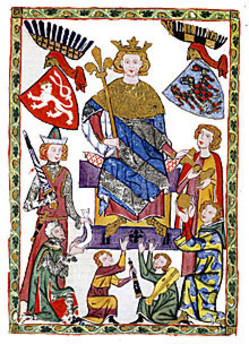2.6.1297 Wenceslas II crowned King of Bohemia
Categories: Personalities , Calendar
 The coronation of Wenceslas II squeezed the royal treasury. The festivities lasted several days and Prague welcomed thousands of distinguished guests. Instead of water, wine flowed from the city's fountains.
The coronation of Wenceslas II squeezed the royal treasury. The festivities lasted several days and Prague welcomed thousands of distinguished guests. Instead of water, wine flowed from the city's fountains.
Towards the nobility, Wenceslas II avoided the mistakes his father had made. He did not reclaim the estates of the estranged landowners and offered lucrative offices in Poland and Hungary to the noble families. At the same time, he respected the growing importance of the provincial assemblies, which had evolved from the early medieval colloquia and were now becoming the political tribune of the emerging provincial community.
The pomp of royal majesty was enhanced by the luxury and refined taste of the Prague court. "The splendour, even vanity, was perhaps most evident during the coronation of Wenceslaus II in 1297. Prague welcomed thousands of distinguished guests, and instead of water, wine flowed from the city's fountains," Jaroslav Pánek and Oldřich Tůma describe the coronation in their book History of the Czech Lands.
The festivities lasted several days. Symbolically on the holiest day of Pentecost, the Feast of the Descent of the Holy Spirit. The ceremony took place in the Church of St. Vitus at Prague Castle and the actual coronation act was performed by Archbishop Gerhard of Mohács. The coronation of Wenceslas II was said to be a true musical festival, with singing, reciting, playing trumpets, drums, lyres, harps and bagpipes. Along with Wenceslas, his first wife Guta of Habsburg was also crowned.
"The twenty-six-year-old queen had been moaning since her recent birth. The lavish ceremony, in which she was burdened with a magnificent dress and splendid crown jewels, was extremely tiring for her. Two weeks after the coronation Guta died," writes Oldřiška Ciprová in her book Guta of Habsburg: The Weak King, the Young Queen and the Mighty Záviš.
The coronation and the associated festivities severely exhausted the royal chamber. Minnesingers found generous refuge in the king's vicinity, and it is said that Wenceslas II himself composed love poems. The wave of knightly fashion was in full swing. Although the nobility adopted German names and called their castles German, they looked with distaste on the entrepreneurial and financial of the German patricians of the big cities, especially Prague, Brno, Jihlava and eventually Kutná Hora.
The nobility began to emphasize their preferential rights in the country. Latin writing and German chivalric poetry began to be accompanied by Czech. Its more expressive literary manifestations were mainly due to the ecclesiastical environment. Gothic was already common in the construction of monumental castles such as Zvíkov, Bezděz or Špilberk.
After Guta's death, Wenceslas II married once more, to Eliška Rejčka. "After the wedding he went on a war expedition to Poland and in August 1300 he was crowned King of Poland in Hnězdno. Less than three years later, another famous coronation took place, this time in Prague.Jan Bauer writes in his book The Secret Loves of Czech Kings and Queens.
Jaroslav Pánek, Oldřich Tůma: The History of Czech Lands, Jaromír Černý: Music in Czech History, Jan Bauer: Secret Loves of Czech Kings and Queens, www.dnyceskestatnosti.cz
The article is included in categories: